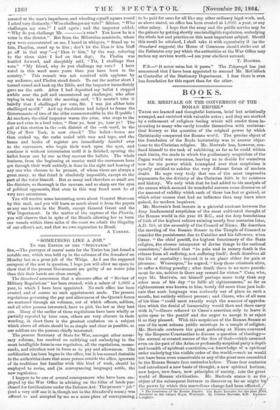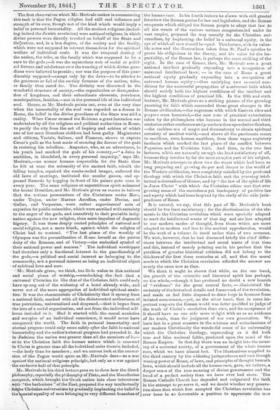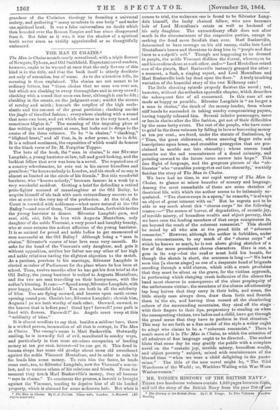BOOKS.
MR. MERIVALE ON THE CONVERSION OF THE ROMAN EMPIRE.*
THESE are learned and thoughtful lectures, brief but artistically arranged, and enriched with valuable notes ; and they are marked by a refinement of religious feeling which will render them in- teresting to many who rarely trouble themselves with ecclesias- deal history or the question of the original power by which Christianity conquered the Roman world. The precise object of the foundation of the Boyle lectureship was to answer objec- tions to the Christian religion. Mr. Merivale has, however, con- fined himself to the task of exhibiting, as far as he could within such limits, the mode in which the preliminary scepticism of the Pagan world was overcome, leaving us to decide for ourselves how far time power which triumphed over that scepticism is equally entitled to subdue the very different forms of modern doubt. He says very truly that one of time most impressive arguments for the divinity of the Christian faith is its existence and history. We only wish that he had added to his analysis of the causes which secured its wonderful success some discussion of the amount of validity which each of these has lost or gained, or which other causes that had no influence then may have since gained, for modern inquirers.
Mr. Merivale's first lecture is a pictorial contrast between the deep fundamental scepticism of the most cultivated thought of the Roman world in the year 63 B.C., and the deep foundations of faith of the highest culture existing nearly four centuries later, A.D. 318, at the assembly of the Council of Niczea. He describes the meeting of the Roman Senate in the Temple of Concord to consider the punishment due to Cataline and his followers, when Caesar, "the chief pontiff, the highest functionary of the State religion, the chosen interpreter of divine things to the national conscience," declared that "in pain and in misery death is the release from all suffering, not suffering itself; death dissolves all the ills of mortality ; beyond it is no place either for pain or pleasure. Whereupon," he argued, "keep those criminals alive, to suffer a fitting penalty ; after death there is no more punish- ment for sin, neither is there any reward for virtue." Cato, who, says Mr. Merivale, set himself perhaps more truly than any other man of his day "to fulfil all righteousness," so far as righteousness was known to him, barely did more than just indi- cate that such language was curiously out of place in such a month, but entirely without protest ; and Cicero, who of all men of his time "could most exactly weigh the amount of approba- tion which the denial of immortality would then and there carry with it,"—Cicero referred to Ciesar's assertion only to leave it quite open to the pontiff and the augur to accept it or reject it as they pleased. With this scepticism of the Roman Senate at one of its most solemn public meetings in a temple of religion, Mr. Merivale contrasts the great gathering at Nicma convened by the Emperor Constantine to discuss a question of theology— the eternal or created nature of the Son of God—which assumed even on the part of the Arian or professedly sceptical party a depth and breadth of spiritual conviction,—a knowledge of a spiritual order underlying the visible order of the world,—such as would not have been even conceivable to any of the great men assembled in the Roman Senate four centuries before. Those four centuries had introduced a new basis of thought, a new spiritual horizon, new hopes, new fears, new principles of society, into the great world of Roman civilization. Mr. Merivale states it as the object of the subsequent lectures to discover as far as might b the power by which this marvellous change had been effected.
• Ths Conversion of the Roman Empire. The Boyle Lectures fur the year Sat, delivered at the Chapel Royal, WhitehalL By Charles alerivale, B.D. Lpadon: Longman. The first observation which Mr. Merivale makes in commencing this task is that the Pagan religion had still real influence and strength of its own, though not of the kind which would imply a belief in personal immortality. All the ancient religions (includ- ing indeed the Jewish revelation) were national religions, in which divine powers were directly invoked on behalf of the State and the:nation, and, in a less degree, of the society and the family, which were not supposed to interest themselves for the spiritual welfare of individual souls. It was the temporal destiny of the nation, the tribe, or the family which was supposed to be a care to the gods ;—it was the mysterious web of social or politi- cal fortune and misfortune over the weaving of which divine guar- dians were believed to preside ; nor was the purpose of this guar- dianship supposed—except only by the Jews—to be ulterior to the greatness or fall of the earthly fortunes of the nation,- tribe, or family thus cared for. The divinity was discerned in the wonderful structure of society,—the organization or disorganiza- tion of kingdoms, and their subordinate elements, provinces, municipalities, families,—not in the personal life of the individual soul. Hence, as Mr. Merivale points out, eve.0 at the very time when the immortality of the soul was regarded as a dream in Rome, the belief in the divine guardians of the State was still a reality. When Caesar crossed the Rubicon a great lustration was undertaken by all the religious, and political authorities in Rome, to purify the city from the act of impiety and schism of which one of her most illustrious children had been guilty. Magistrates and citizens, Vestals, Salians, and Flamens, strove to expiate Ccesars guilt as the beet mode of securing the favour of the gods in resisting his rebellion. Augustus, who, as an adventurer, in his youth had mocked the gods of his country,—" a Jelin in ambition, in bloodshed, in every personal impurity," says Mr. Merivale,—no sooner became responsible for the State than he felt at once the solemnity of the ancient faith, rebuilt the falling temples, repaired the smoke-soiled images, enforced the old laws of marriage, instituted the secular games, and ap- peased Nemesis by begging in front of his palace gate once in every year. The same religious or superstitious spirit animated the brutal Dornitian, and Mr. Merivale gives us reason to believe that the various persecutions .of the Christians under Nero, under Trojan, under Marcus Aurelius, under Decius, and Gallus, and Vespasian, were rather experimental acts of expiation for public calamities, which were ascribed with certainty to the anger of the gods, and tentatively to their probable indig- nation against the new religion, than mere impulses of dogmatic bigotry. It was these deeply rooted principles of national and social religion, not a mere blank, against which the religion Of Christ had -to contend. "The last- phase of. the worship of Olympus was the personification of. Rome herself as the patron deity of the Romans, and of Victory—the embodied symbol of their national power and success." The individual worshipper had therefore only a fractional .interest ita the guardianship. of the gods,—a political and social interest as belonging to. the community, not a personal interest as being an individual object of spiritual love and care.
• Mr. Merivale gives, we think, too little value to this national and social phase of worship,—overlooking the fact that a universal Christian tie like that of the Christian faith could only have -sprung out of the widening of a bond already wide, and never out of the mere aggregation of individual spiritual anxie- ties. It was the characteristic of Christianity that it sprang from a national faith, marked with all the disinterested enthusiasm of true patriotism, universalized and deepened,—that it began from the love of a social organization, and not from the individual self- loves -included in it. Had it started with the moral anxieties and scruples of an individual conscience, it would never have conquered the world. The faith in personal immortality, and eternal progeesi could only come safely after the faith in national immortality and the uation's eternal progress had preceded it. As in Judaism the nation was greater than all the members of it,— so in the Christian faith the human nature which is renewed in Christ is greater than all the individual units therein included, —the body than its members ; and we cannot look at the conver- sion of the Pagan world quite as Mr. Merivale does—as a war against the national religious principle, but only as a war against the exclusive half of that principle.
Mr. Merivale in his third lecture goes on to show-how the Greek philosophy, especially the philosophy of Plato, and the Macedonian conquest, which brought the Greek nation into close intercourse with "the barbarians "of the East, prepared the way intellectually foitthe Christian universalism by gradually implanting the belief in theVental equality of men belonging to very different branches of the human race. In his fourth lecture he shows with still greater force how the Roman genius for law and legislation, and the Roman conquests which obliged the Roman people to adapt that law to all time wants of the various nations comprehended under its vast empire, prepared the way morally for the Christian uni- versalism, by implanting the belief in fl, universal equity, in the eye of which all men should be equal. This lecture, with its valua- ble notes and the illustrations taken from St. Paul's epistles to prove his obligations to the theory, and ids value for the im- partiality, of the Roman law, is perhaps the most striking of the eight. In the case of Greece, then, Mr. Merivale Zees a greet national intellect gradually expanding into a recognition of universal intellectual laws; — in the case of Rome a great national' equity gradually expanding into a recognition of universal human equity ;—thus satisfying two essential con- ditions for the successful propagation of a universal faith which should satisfy both time highest conditions of the intellect and time highest conditions of practical life. In the fifth and sixth lectures, Mr. Merivale gives us a striking picture of the growing yearning for faith which succeeded these great changes in the Roman civilization,—the eagerness with which Eastern rites and prayers were borrowed,—the new tone of practical exhortation taken by the philosophers who became in the second and third centuries rather confessors and preachers than speculative thinkers, —the reckless use of magic and thaumaturgy to obtain spiritual certainty- of another world,—and above all the passionate resort to sacrifices, even.human sacrifices, from those vague expiatory instincts which marked the last phase of the conflict between Paganism and the Christian faith. And then, in the two last lectures, which are naturally enough the least satisfactory of all, because they involve by far the moat complex part of his subject, Mr. Merivale attempts to show how the wants which had been so long preparing and grawing deeper and deeper iu the world of the Western civilization, were completely satisfied by the profound theology with which the Christian faith met the yearning intel- lectual universalism of Greece, and by" the law of the spirit of life in Jesus Christ " with which the Christian ethics met that ever growing sense of the sacredness yet inadequacy of positive law and equity which had been inspired by the study of the wide juris- prudence of Rome.
It is natural, we say, that this part of Mr. Merivale's book should be the least satisfactory ; for the discritnination of the ele- ments in the Christian revelation which were specially adapted to meet the intellectual wants of that day and are less adapted to our modern modes of thought, from those which are more adapted to modern anti less to time ancient apprehension, would be the work of a volume in itself rather than of two sermons. We wish, however, that he bad discussed briefly the chief differ- .ences between the intellectual and moral wants of that time and this, instead of merely pointing out in his preface that. the precision of genuine historical criticism did not belong to the thinkers of the first three centuries at all, and that time moral needs to which the Christian revelation afforded the answer are nearly the same now as then. We think it might be shown that while, on the one band, the growth of the scientific and historical spirit has perhaps, on the .whole,—though it has produced no doubt a new branch of "evidence" for the great central facts, — diminished the certainty of the historical details and framework of the revelation, and made us feel little disposed to draw large in fereuces from isolated occurrences,—yet, on the other hand, that in some kit- portant respects the Roman world was better qualified to judge 'of the truth of Christ's revelation than ours, and its acceptance of it should have on one side more weight with us as an evidence of its truth, than the judgment of our own generation. We have lost in a great measure in the schisms and sectarianiams of our modern Christianity the wonderful sense of its universality which the Christian theology, superseding as it did both true and false national faiths, produced upon the mind of the Roman Empire. In that day there was an insight into the mean- ing of a universal society, of a government of the whole human race, which we have almost lost. The illustrations supplied to time third century by the widening jurisprudence and vast thongh waning power of Rome, of laws, and priuciples of thought beneath laws, which should include all the human race, gave, we believe, a deeper sense of the true meaning of divine government and the bond of a perfect society than we have ever had since. The Roman Catholic Church has degraded and vulgarized the faith in the attempt to preserve it, and we doubt whether any genera- tion since that which first accepted the Christian revelation has over been in so favourable a position to appreciate the true
grandeur of the Christian theology in founding a universal society, and gathering " many members in one body" and under one spiritual head. It was a false universalism no doubt which then brooded over the Roman Empire and has since disappeared from it. But false as it was, it was the shadow of a spiritual truth never since so vividly apprehended or so thoughtfully embraced.




































 Previous page
Previous page